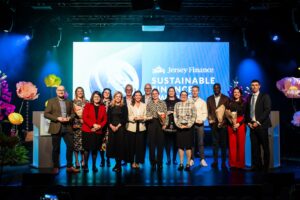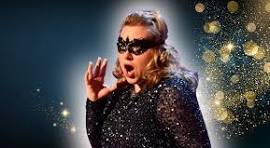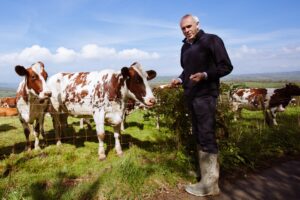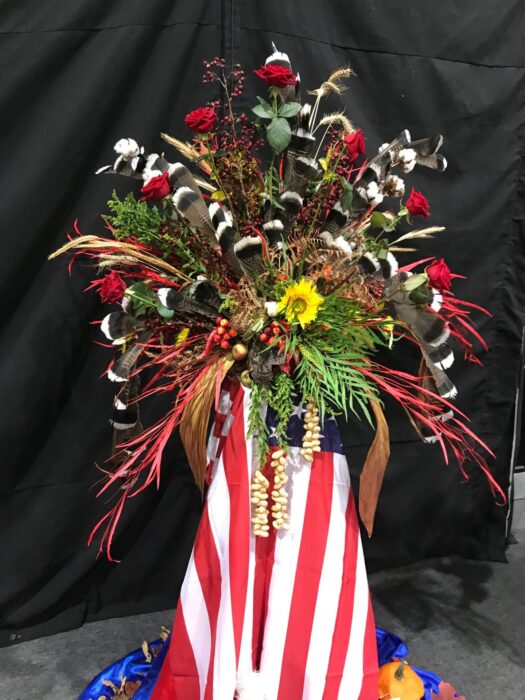
THE Autumn Show of the Royal Jersey Agricultural Society is always a very special event.
‘It feels like a club,’ said one visitor to the show who had rarely been to the society’s cattle and flower shows before. Indeed, it is a club, but one at which all are welcome, and which shows off the very best of rural life in the Island. ‘The heart of rural Jersey’, as the society proclaims in its publicity —which is the unvarnished truth.
This last show of the of the year was a great success, with around 2,500 people visiting the show over the two days, Saturday and Sunday 2 and 5 October. weekend. The Horticultural and Cattle Shows were well attended, with a record number of 1,200 entries in the Horticultural Show.
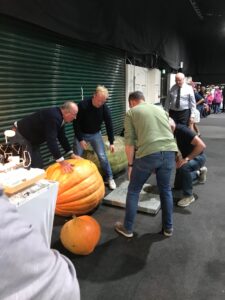
As ever, there was a fairy-tale dimension to the ‘heaviest and longest’ vegetable classes: Richard Le Sueur won the first prize for the heaviest pumpkin: 395.51lbs – not quite up to his record-breaking result of 979 lbs in 2018, but a creditable weight, even though he said ‘it was only a small one’. However, he set a new record with his heaviest squash: 588lbs.
Trevor and Felicity Rabet’s heaviest cabbage weighed in at 27lbs 11ozs, the States of Jersey Prison service set the record for the longest leek: 26 inches; Sophie Myatt had a record-breaking widest sunflower head: 10 inches. There were no entries in the highest beanstalk class.
The Discover Dairy marquee was a great success with lots of children taking part in the scavenger hunt and receiving a free Jersey Dairy ice-cream.
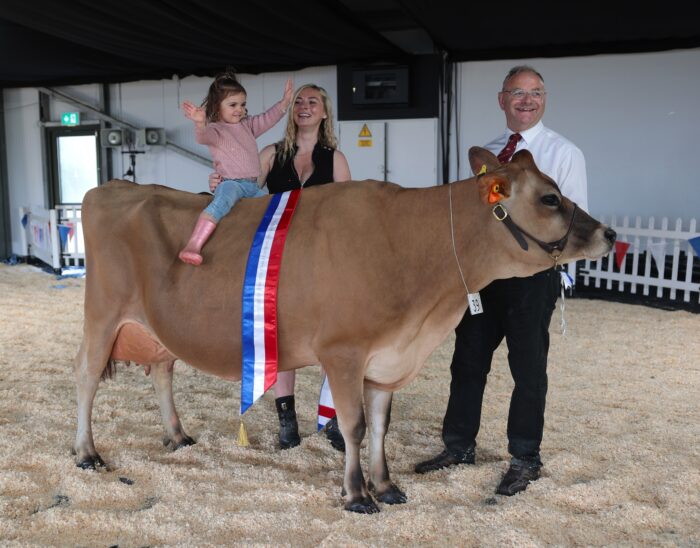
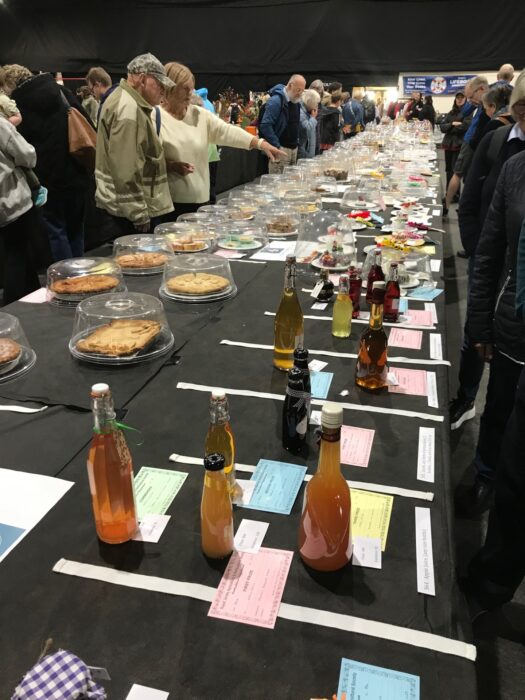
The supreme championship in the cattle show was won by Gene Countess Devinci Opel, a young cow, aged four years old, and owned by Lodge Farm’s Rebecca Barnes-Barrington (Becky Houzé). Runner-up was La Ferme’s Ansom Quango Cyber. The same two cows won the best uddered championship.
The turnout of exhibitors was also very good. There are predominantly five herds that show, out of a total of 12 herds in the Island. Seven of the herds were showing on Sunday, including, for the first time, heifers the organic herd at Clairval Farm, owned by Gaynor and Zoë Marshall.
In addition to the 2,500 people who came to the Autumn Show, a further 3,500 people watched the cattle show livestream.
‘It’s not a new idea,’ said the club’s president, Paul Houzé, ‘many of the big international shows have been doing this for some years; this is our second year for doing it; it shows the interest around the world. Our Lodge Farm was lucky enough to win the championship, and straight after the show we received a good number of congratulations from our friends in Canada and the USA.’
The show was judged by Rob Anderson, who owns a Jersey breed dairy farm in Victoria, Australia.
‘We normally team up with the UK’s National Jersey Society to share a judge,’ said Paul.’ They hold their autumn show at the Bath and West showground in Shepton Mallet in Somerset on a Wednesday; then the judge travels to Jersey for the weekend show here. So we share the travel costs. We find it quite exciting to have top class international judges from Canada or the USA, Denmark or Australia, but obviously it is quite costly to bring someone over from far afield.
‘This arrangement has been really successful and it allows us to invite highly respected cattle breeders. The benefits are not only do we get a top-class international judge, but also, we get people who can act as ambassadors for the Jersey Island herd, and can return to their own countries to say that our cattle are of a very high standard.’
Rob Anderson, who was visiting Jersey for the first time with his wife, Kerry, have a 280-milker herd on their farm. The herd goes back four generations and their family has kept Jersey cows since the 1880s — 140 years of breeding Jerseys.

‘We have one of Australia’s original Jersey cow families,’ Rob said, ‘and we still have the original bloodlines. One of the original cows was a descendant of a ship’s cow that came by sailing ship from Jersey.’
His father imported a number of cows (by airfreight) and since then the herd has grown from 65 cows to its present size.
Rob said how impressed he had been with the size of the classes – making a good number of animals from which he could select a winner. There were big numbers in the heifer classes which makes it easier to judge: ‘Sometimes when you have a class of only two or three, which is harder; with a bigger class you can look for what suits you.
‘Sometimes, when I have had the privilege of judging at other shows, you get to the second-last class, and you still haven’t got a potential champion in my mind You might have had nice cows, but nothing special and not that special cow that everybody has to beat. Then, all of a sudden, in she walks, then we’ve got the champion for the day, and you have that picture of what you are hoping for: a cow in balance and a good representation of the breed.’
He added: ‘It was a good show, both in quality and quantity. It was also tremendous to see so many young competitors and handlers. It was a great experience, to come here and judge at the home of the breed.’
Things seem to be looking good for the society: membership is rising, with close on 800 members – most of those being in the horticultural department. But membership is up in both departments.
The society also runs Jersey Island Genetics, the company which looks after the provision of all the services, of which the importation of genetics is just one. It also stores all the semen, and its distribution, and runs the milk recording, and, of course, the herd book register, its fundamental activity, which it has been doing since 1866.
Paul said: ‘We are unique in Jersey that every single animal, every pedigree Jersey cow, is registered in the herd book — you don’t get that in any other jurisdiction.
‘We are also blessed with some great staff, who live and dream the job.
‘As president , what I am trying to do is to get cross fertilisation between the agricultural and horticultural departments. Membership is up; members’ events and activities are up —everybody is welcome.’
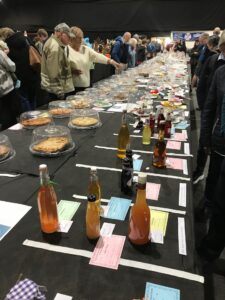
- For membership enquiries, see the society’s website: www.royaljersey.co.uk
- This article is reprinted by kind permission of the Jersey Evening Post


